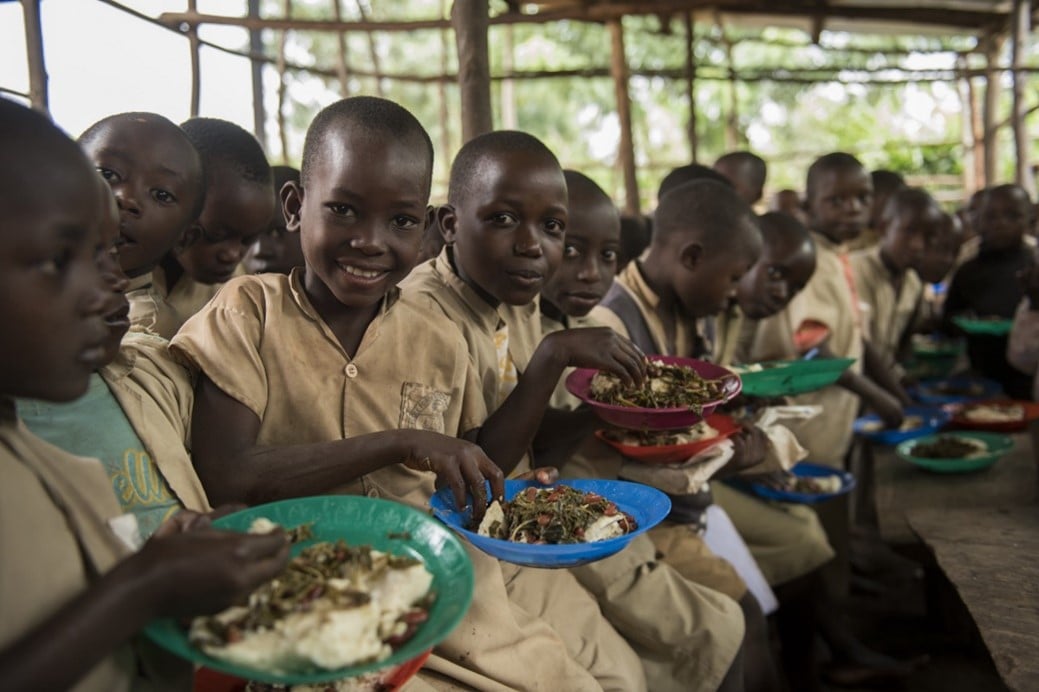Amid converging global crises, how might school meals offer a solution?
London School of Hygiene & Tropical Medicine https://lshtm.ac.uk/themes/custom/lshtm/images/lshtm-logo-black.png Friday 17 March 2023
Even before the war broke out in Ukraine, global food prices had reached a record high. Supply chains that had already been severely disrupted by the COVID-19 pandemic were almost pushed to breaking point by the climate-related extreme weather events of 2021. Then, when the conflict began, the price of key commodity crops, fuel, and fertiliser skyrocketed overnight.
Half of the 345 million people projected to experience food insecurity in 2023 are children: the same children who missed out on up to two years of education and school meals due to pandemic-related school closures, and the same children who will grow up to bear the full brunt of the rapidly growing climate emergency.
Here, caught between three convergent crises – COVID-19, conflict, and climate change – the world finds itself urgently seeking solutions that will protect the health, education, wellbeing, and future of its young people.
Building the government-led School Meals Coalition
The closing of schools worldwide produced a troubling counterfactual as to what happens when children no longer have access to the social safety net provided by the school platform. Not only did they miss out on vital learning, but they also lost access to the essential health and wellbeing services delivered through schools that support their growth and ability to fulfill their potential – with life-long consequences.
In October 2021, heads of state from countries worldwide at all income levels responded by creating the School Meals Coalition (SMC): a global action now led by 78 (and growing) national governments who, following the devastating impact of the pandemic on their schoolchildren, pledged to rebuild, improve, or scale up their national school health and nutrition programmes, to give children the greatest chance of fulfilling their potential when schools reopened.
Establishing a global Research Consortium for School Health and Nutrition
To support the member states of the School Meals Coalition in the design of well-informed, robust national policy, the countries called for the establishment of a global Research Consortium for School Health and Nutrition.
With a Secretariat hosted by the London School of Hygiene & Tropical Medicine (LSHTM), and communities of practice that connect academic networks across the world, the Research Consortium is a global, multi-partner network of thought leaders and academic institutions. The Consortium was set up to conduct and coordinate research into the design, cost, benefits, and impact of school health and nutrition programmes across every income level and to share programmatic guidance with the countries of the School Meals Coalition.
The far-reaching benefits of school meals
But why school meals? And, amid multiple global crises, how might they offer a solution?
A study by the Research Consortium in 14 low- and middle-income countries found that every US$1 invested in school meals programmes could yield a return of between US$7 and US$35. Analysis showed that the overall benefits of school meals are several times greater than the returns to public health alone, proving to be of significant value for money across multiple sectors, including education, social protection, agriculture, and boosting the local economy. Studies are planned in eight countries to track these benefits as schools reopen.
The full extent of the far-reaching benefits of school meals was summarised in a statement produced by the Research Consortium and presented to the ministers of the School Meals Coalition at the first annual SMC Ministerial Meeting in Helsinki in October 2022.
School meals in a changing climate
The children of today, having already endured radical learning losses, significantly reduced access to health and wellbeing services, and a global food crisis induced by war and extreme weather, face a more uncertain future still.
As global temperatures and sea levels rise, so will the rates of heat waves, droughts, floods, cyclones, and wildfires. Over the next 30 years, as the global population grows and there are more mouths to feed than ever, food supply and security will become increasingly threatened. The UN Food and Agriculture Organization (FAO) predicts that in order to feed the projected global population of 9.1 billion people by 2050, food production must increase by at least 70 percent.
Adapting our food systems to changing and unpredictable climate events is therefore imperative. One way of doing this is through home-grown school feeding: a school food model that, rather than relying on global food chains to feed hungry children, places locally produced and procured food at the heart of the school food menu. In doing so, it – in many contexts – may improve food security, and offers the potential to boost local agriculture, improve child nutrition, and maximise returns to the local economy. Another adaptation may be, especially in higher-emitting, higher-income countries, to re-consider the menu of school food, for example reducing the amount of animal source protein, with likely benefits for both human health and planetary health.
Forging ahead
It is with this knowledge that the United Arab Emirates, host of the 2023 UN Climate Change Conference (COP28) and member of the School Meals Coalition, invited the Research Consortium to lead on a White Paper on the relationship between school feeding and climate change. The paper, which will be presented to the ministers of the School Meals Coalition at the next SMC Ministerial Meeting in Paris, hosted by President Macron later this year, will examine the economic, financing, agricultural and nutrition dimensions of climate-conscious school meals, equipping policymakers with evidence to support action towards climate-smart school food solutions.
The paper is being developed jointly by the Research Consortium and the Centre on Climate Change and Planetary Health, both based at LSHTM, in collaboration with climate scientists and institutions across the world.
LSHTM's short courses provide opportunities to study specialised topics across a broad range of public and global health fields. From AMR to vaccines, travel medicine to clinical trials, and modelling to malaria, refresh your skills and join one of our short courses today.